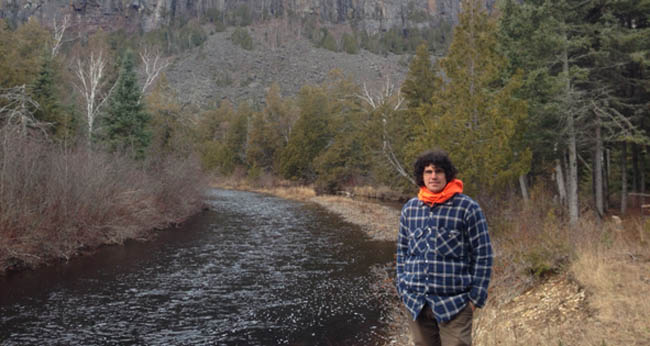Land use important to our self-determination

By Rick Garrick
Lake Helen’s John Carlson is conducting a traditional land use study on hunting, trapping, fishing and gathering activities in his Robinson Superior community’s traditional territory.
“I’m really interested in the traditional land use of our cultures and the importance of its various forms to our self-determination and traditions of governance,” says the 32-year-old University of Victoria masters student who is originally from Ottawa. “It is very important to exercise these activities as ways through which we are present on the land as responsible self-determining peoples. It is also crucial to understand that these activities are not the only traditional livelihoods that indigenous peoples engage in; such representations, as gendered depictions, often lead to a deep misunderstanding and exclude women as integral agents in the development and health of our peoples.”
Carlson began the traditional land use study for his master’s degree in Indigenous Governance in late October with a completion date scheduled for April 2015. Although he did not grow up on the land, he says his family has “a rich tradition of being out on the land.”
“This way of life is something that mattered to my family and continues to matter to them,” Carlson says. “I believe I have a responsibility to take up these traditions in order to carry them on.”
Carlson now practices trapping on his community’s traditional lands.
“As you experience things first-hand (as a trapper), through an intimate interaction with the land and the animals, you notice things and you can see just how deeply affected the environment is by all the activity that is going on,” Carlson says. “This cultural presence on the land is an important way of keeping tabs on what is going on and to hold people accountable (for their activities on the land). It is a form of governance.”
Carlson says First Nations people have a responsibility to vocalize the significance of traditional resources to their cultures and to hold companies accountable for what they do on the land.
“You can’t do that if you do not know what is going on out there,” Carlson says. “People that do spend time on the land know what is happening out there, which is one reason among many others for why it is important to keep that presence ongoing and strong. This is an important means of maintaining and developing the political capacity of our nations.”
Although Lake Helen has been impacted by numerous developments over the years, including transportation routes, hydro dams and gas pipelines, Carlson says community members are healing and looking to empower their traditional way of life.
“Many communities across the continent face similar challenges,” Carlson says. “People are looking to redeem their cultures and the values that embody them and foreground these once again. That is not an easy task to go about, but I know that many people certainly agree it is within these traditions and our ceremonies and collective activity that indigenous peoples are able to address some of the larger problems within our communities.”
Carlson feels his responsibility is to shed light on and celebrate the practices and traditions that take place on the land.
“I see my cousin, who is an experienced hunter, trapper and fisherman, as a great teacher,” Carlson says. “People like him, for example, along with many others, which certainly include the women of our communities, need to be recognized and celebrated as teachers because they are the ones who pass down this knowledge and who transmit the culture, and, as such, are indispensable to the integrity of our political traditions.”

